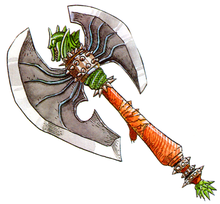Headsman's axe
| Headsman's axe | |
|---|---|

| |
| Japanese | まじんのオノ |
| Romaji | {{{romaji}}} |
| Old localizations | Demon axe Headsman's axe |
| Found in | 'Dragon Quest III Dragon Quest VII Dragon Quest IX |
| Effect | Low accuracy, high critical hit chance |
The Headsman's axe is a recurring weapon in the Dragon Quest series. It is a ferocious-looking axe that provides melee-oriented characters with considerable boon in the late-game part of their journey. It is the first of the low-accuracy-but-always-critical category of weapons, such as Hela's hammer.
Appearances
Dragon Quest III
Found in the Castle of Baramos, the Headsman's axe gives an attack bonus of +90 (+105 in the remakes) to Warriors, and will land a critical hit exactly 12.5% (1⁄8) of the time. A chance to miss the target entirely, also 12.5%, balances this out. It can be sold for 375 gold coins.
Dragon Quest VII
Aishe is the only one who can equip the axe in either version of VII. It provides +108 attack, +20 Style, and a reduced accuracy of 3⁄8 (37.5%). As it is not cursed and does not consume MP upon use, it is more convenient to use than the normal Hela Hammer and Hatchet Man.
The axe is incredibly hard to come by in a normal playthrough, being dropped only by Vulgarians at a 1⁄256 rate.
Dragon Quest IX
Much like the Hela Hammer, the Headsman's Axe has lost its special critical hit rate, and is simply an incredibly powerful weapon.
| Headsman's Axe (DS) | |
|---|---|
| Attack | 98 |
| Rarity | 2/5 |
| Equipable by | |
| Buy Price | 28800 |
| Sell Price | 14400 |
| Flavor text | An enormous axe of frankly fearsome force. |
| Executioner's Axe (DS) | |
|---|---|
| Attack | 115 |
| Rarity | 1/5 |
| Equipable by | |
| Buy Price | 0 |
| Sell Price | 16600 |
| Flavor text | A revolutionary rustproof refinement of the headsman's axe. |
Combine the headsman's axe with two Ethereal stones and a Raging Ruby.
Etymology
Headsman is an antiquated term for a judicial executioner. Specifically, it refers to one who executes convicted criminals via decapitation by a large axe. These axes would be inscribed with the words Cast in the name of God, ye not guilty, to show that the executioner was not guilty of murder in the eyes of God.